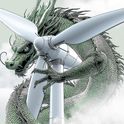
George Macartney refuses to bow before Emperor Qianlong in 1792 © The Art Archive/ Eileen Tweedy
Matteo Ricci was an Italian Jesuit missionary who travelled to China in 1583. He learnt the language and in 1601 was appointed an advisor to the emperor on account of his knowledge of astronomy. He died in Beijing in 1610. He writes: “Of all the great nations, the Chinese have had the least commerce, indeed, one might say that they have had practically no contact whatever, with other nations, and consequently they are grossly ignorant of what the world in general is like... Their universe was limited to their own 15 provinces, and in the sea painted around it they had placed a few islands to which they gave the names of different kingdoms they had heard of. All of these islands put together would not be as large as the smallest of the Chinese provinces. With such a limited knowledge, it is evident why they boasted of their kingdom as being the whole world, and why they call it Thienhia, meaning everything under the heavens... “Because of their ignorance of the size of the earth and the exaggerated opinion they have of themselves... they look upon all other people not only as barbarous but as unreasoning animals... “The Chinese place absolutely no trust in any foreign country, and thus allow no one at all to enter and reside here unless they undertake never again to return home, as is the case with us.”
In 1769, William Hickey records his entertainment at a country house near Canton by a Chinese merchant called Pankeequa: “These fêtes were given on 1st and 2nd October, the first of them being a dinner. Dressed and served à la mode anglaise, the Chinamen on that occasion using, and awkwardly enough, knives and forks, and in every respect conforming to the European fashion... In the evening a play was performed, the subject warlike, where most capital fighting was exhibited, with better dancing and music than I could have expected. In one of the scenes an English naval officer, in full uniform and fierce cocked hat, was introduced, who strutted across the stage, saying ‘Maskee can do! God damn!’ whereupon a loud and universal laugh ensued, the Chinese, quite in an ecstasy, crying out ‘Truly have muchee like Englishman.’ “The second day, on the contrary, everything was Chinese, all the European guests eating, or endeavouring to eat, with chopsticks, no knives or forks being at table... At night brilliant fireworks (in which they also excel) were set off in a garden magnificently lighted by coloured lamps, which we viewed from a temporary building erected for the occasion and wherein there was exhibited sleight-of-hand tricks, tight- and slack-rope dancing, followed by one of the cleverest pantomimes I ever saw. This continued until a late hour, when we returned in company with several of the supercargoes to our factory, much gratified with the liberality and taste displayed by our Chinese host.”
In 1792, the British government sent George Macartney as its first envoy to the Imperial Court in Peking, to expand trading links. The embassy failed through mutual misunderstanding of culture. Macartney writes in his journal: “A little before that period [of Marco Polo’s visit to China in the 13th century] the Chinese had reached their highest pitch of civilisation, and no doubt they were then a very civilised people in comparison of their Tartar conquerors, and their European contemporaries, but not having improved and advanced forward, or having rather gone back, at least for these 150 years past, since the last conquest by the northern or Manchu Tartars; whilst we have been every day rising in arts and sciences, they are actually become a semi-barbarous people in comparison with the present nations of Europe. Hence it is that they retain the vanity, conceit, and pretensions that are usually the concomitants of half-knowledge, and that, though during their intercourse with the embassy they perceived many of the advantages we had over them, they... sometimes affected not to see what they could not avoid feeling. In their address to strangers they... present themselves with an easy confident air, as if they considered themselves the superior.”
Henry Kissinger, national security advisor in President Nixon’s first administration who travelled to China in 1971 on a secret diplomatic mission, recalls: “The early stages of the Sino-American dialogue focused primarily on the meshing of concepts and fundamental approaches. Mao [Zedong], Zhou [Enlai] and later Deng [Xiaoping] were all extraordinary personalities. Mao was the visionary, ruthless, pitiless, occasionally murderous revolutionary; Zhou, the elegant, charming, brilliant administrator; and Deng, the reformer of elemental convictions... “Their negotiating style was as different from that of their Soviet counterparts as was possible to be... Soviet diplomats almost never discussed conceptual issues. Their tactic was to select a problem of immediate concern to Moscow and batter away at its resolution with a dogged persistence designed to wear down their interlocutors rather than persuade them... Chinese leaders represented an emotionally far more secure society. They were less interested in drafting points than in building confidence.”











